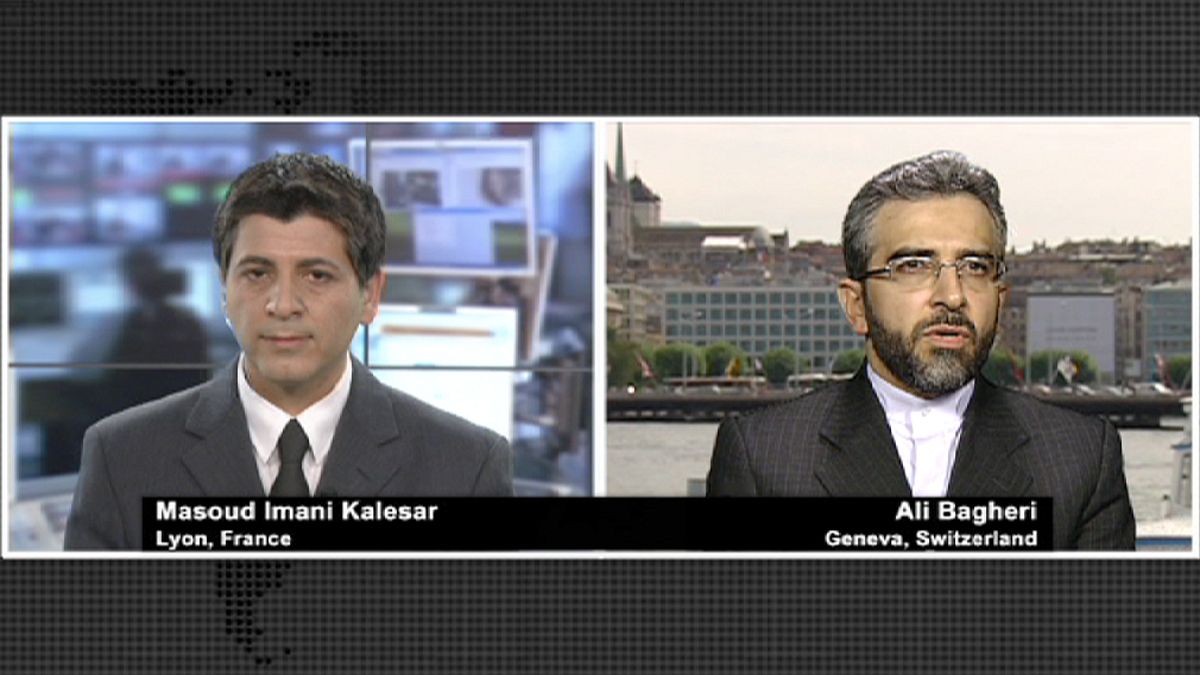Mahmoud Ahmadinejad has reviewed his last annual military parade as head of state of Iran. That role will go to someone else on 8 June.
These occasions have, for him, always been about threatening the enemy United States and Israel. This last time, a week ago, he likened Israel’s talk about striking Iranian nuclear sites to “the harmless barking of a dog”.
A few days later, the US Defence Secretary was visiting the region, partly with a sample case, so to speak, of weapons to sell to allies, notably Israel, but also to the United Arab Emirates and Saudi Arabia. This was Chuck Hagel’s way of sending Tehran a very clear signal.
Neither side’s rhetoric has evolved much. Nor have talks involving the International Atomic Energy Agency watchdog. Another round of those is scheduled for mid-May. Diplomatic negotiations with the major western powers are also still in the doldrums.
And, far from putting its nuclear programme to sleep, as these powers are urging, Tehran has stirred it up. Two new uranium mines were brought online earlier this month, to supply enrichment centrifuges.
Iran’s ambassador to the UN nuclear watchdog agency has not offered specifics on how Iran could move to a cooperative dialogue with the West, which has demanded concrete Iranian action to allay international concern that it is trying to develop the means to produce nuclear weapons.
The ambassador said on Tuesday that Iran will pursue all legal areas of nuclear technology, exclusively for peaceful purposes and that “…hostile policies of Western countries, including sanctions-and-talks policies, are doomed to failure.”
Europe and the US have toughened oil and banking sanctions on the Islamic Republic, adding to its currency problems. Prices on imported basic foods have been affected the most, as Inflation has risen above 30 percent. But that has not made Tehran back down.
Ahmadinejad cannot run again; he has served his maximum two terms. Whoever wins will inherit an economic and diplomatic ruin. But experts say that will not much change Iran’s policy on its nuclear programme.
An interview with Ali Bagheru, Deputy Secretary of the Iraninian National Security Council
Euronews: Whilst Iran is a signatory to the NPT, what can be the reason for the West’s lack of trust and why does the US say Iran poses the biggest threat to the credibility of the NPT?
Ali Bagheri: In the Name of God. In the past years, some Western countries, including Americans, have adopted non-constructive and illogical approaches which show that they are, in fact, against the Iranian people benefiting from their rights including their rights as envisaged in the Non-Proliferation Treaty.
IAEA inspectors [inspections] and also other tools used by the International Atomic Energy Agency in Iranian nuclear facilities as well as continuous supervision of the IAEA on these activities; leave no grounds for concerns over the nuclear activities of the Islamic Republic of Iran; the same as other countries who have such peaceful nuclear activities under the supervision of the Agnecy.
Euronews: Mr. Bagheri, international politics and diplomacy is described as an arena for giving and taking. But how can we justify the economic and political prices that Iran is paying because of the uranium enrichment programme and the embargo? For example, in the situation after the recent bombings in Boston, US; now Canada has arrested two people whom it says are related to “alQaeda elements in Iran”.
Ali Bagheri: This is exactly the proof of the illogical and non-constructive approach of some of these Western countries. I do remember when the European Union was about to write the MK [Mujahedin Khalq Organization] name off the EU’s list of terrorist groups. At that time, we were trying to tell the EU officials that this small group is a terrorist grouplet and it has commited tens of terrorist crimes; they blatently replied to us that as long as you do not work with us and do not step back, we will use the other means we have against you.
We have a long history of the attitude of some Western countries towards the Islamic Republic of Iran. One of the reasons for theirfailure in dealing with issues regarding Iran is their lack of knowlege on such issues and their miscalculations. Anybody who is familiar with the basics of Shi’ism as well as the Salafism, know that these two religions have not only got no common grounds but they also have very serious differences
Euronews: Iran will soon have a new President and a new government. In your opinion, will the new president and the new government adopt a new approach regarding the nuclear issue or not? And if there is going to be such basic change, will such a decision be taken by the government or as it is said by the Iranian leadership, Ayatollah Seyed Ali Khamenei?
Ali Bagheri: I am confident that the presidential elections can open a new door towards the nuclear issue and the Islamic Republic of Iran can appear on the scene of the nuclear talks as well as the nuclear activities with more strength; and [I am confident that] it will present itself on new areas with power and authority, and show its readiness for cooperation with other countries including teh 5+1 [group of world power currently in talks with Iran] in different areas including the nuclear issue.
Euronews: Ali Bagheri, Deputy Secretary of the Iranian National Security Council, thank you.
Ali Bagheri: Thank you


